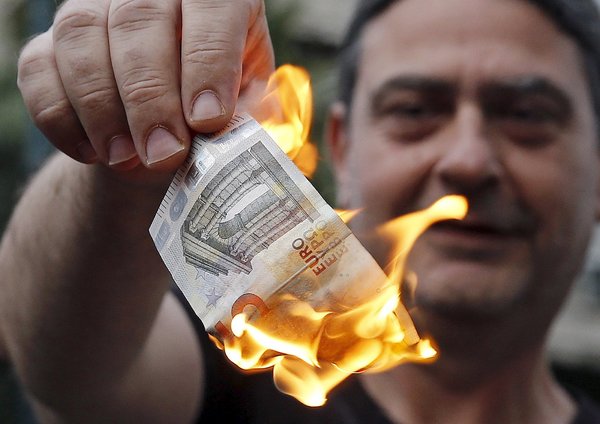PBS: Escaping Eritrea … [Read More...] about ካብ ውሽጢ ቤት ማእሰርታት ኤርትራ
The Next Few Days Have the Potential to Transform Greece and Europe
As it turns out, the Greek crisis ends not with a bang, but with a referendum.
It has been easy to ignore the doings in Greece for the last few years, with the perpetual series of summits in Brussels that never seem to resolve anything. But it’s time to pay attention. These next few days are shaping up to become a transformational moment in the 60-year project of building a unified Europe. We just don’t yet know what sort of transformation it will be.

The immediate headlines that got us to this point are these: After an intractable series of negotiations over a bailout extension with Greece’s creditors, the nation’s left-wing government left the table Friday and said it would hold a referendum on July 5. Greek leaders think the offer on the table from European governments and the International Monetary Fund is lousy, requiring still more pension cuts and tax increases in a depressed economy, and intend to throw to voters the question of whether to accept it.
Whatever the exact phrasing of the question (and assuming the referendum goes forward as planned), it really boils down to this simple choice:
A “Yes” vote means that Greece will continue the grinding era of austerity that has caused so much pain to its citizens over the last five years, in exchange for keeping the euro currency and the monetary stability it provides.
A “No” vote almost certainly means that the country will walk away from the euro and create its own currency (which will surely devalue sharply), bringing financial chaos in the near term but creating the possibility of a rebound in the medium term as the country becomes more competitive with its devalued currency.
The Greek government, led by Alexis Tsipras, disputes this framing, and argues that Greece could in fact reject the creditors’ offer to extend the bailout program while sticking with the euro. Events over the weekend show how untenable that is. Thousands of Greeks lined up to withdraw euros from money machines, and the European Central Bank said it would not increase the size of the emergency lending program that Greek banks have been using to secure euros.
Ergo, the Greek banks are, or will soon be, out of money, and the E.C.B. will be disinclined to open the floodgates again in the absence of a bailout deal. That’s why the Greek government has effectively frozen its financial system, closing banks and the stock market on Monday.
Capital controls that limit people’s ability to withdraw and move money out of the country are, it is safe to say, not a sign of a healthy currency union. It would be hard to call the dollar the national currency of the United States if laws prevented me from taking Maryland dollars and depositing them in a Virginia bank.
The developments show how little power Mr. Tsipras and the Greek government really have if they want to keep using the euro currency, as their campaign platform called for and as is widely popular in Greek polls. European leaders in Brussels and Frankfurt and Berlin may not be fair, or democratic, and there’s a good case that the economic policy they are advancing is not very sound. But they hold all the power in this situation, and are leaving Greeks to decide between two bad options.
But if you zoom out a little further from the brinkmanship, this standoff goes from remarkable and shocking to inevitable and even overdue.
For years Greece has muddled along with a depressed economy and an endless series of bailouts and austerity. It’s fine to play the blame game over how public debt got out of control in the country, but by the time 2010 came around what was done was done, and the human consequences of austerity have been grave.
The Greek government apparently agrees that the definition of insanity is doing the same thing over and over again.
What happens now? This isn’t 2010. European banks, governments and financial markets have had years to develop contingency plans for what will happen if Greece exits the euro. There may be a middle ground, too, in which Greece semi-exits the euro: Imagine keeping the currency but with such strict and permanent capital controls that Greek’s euros are actually a different currency from the one used in Paris or Rome.
Expect the E.C.B. and European institutions to deploy enormous financial firepower to prevent a Greek exit from spilling over to Portugal and Italy and Spain. But saying that this won’t be a Lehman Brothers-style economic catastrophe isn’t the same as saying it would be a good thing. In geopolitical terms it would push Greece closer to a hostile Russia. It would set a precedent that the European currency, and the European Union more broadly, is more fragile than its leaders would like the world to think.
The world should be rooting for a happy outcome to this Greek tragedy. It’s just not at all clear what a happy outcome would look like at this point.
